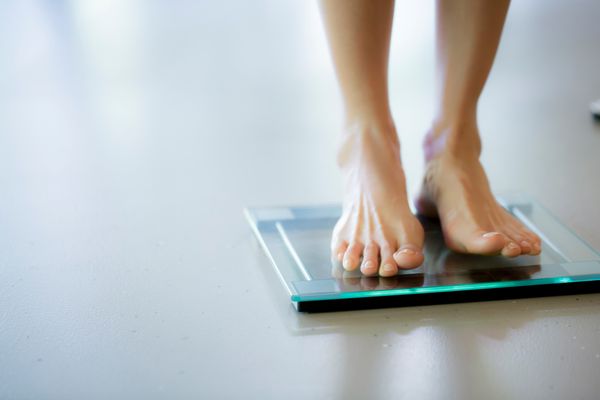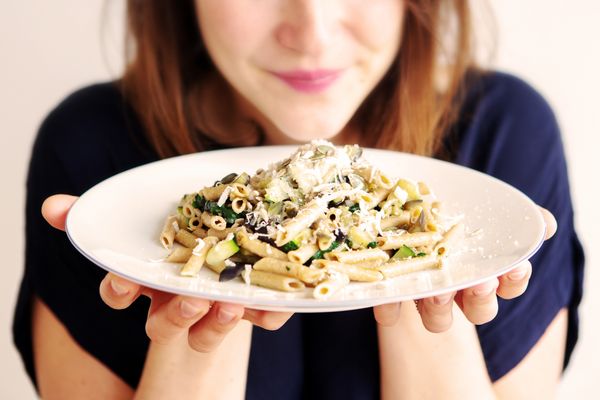You suddenly realize you're eating the same but gaining weight. Lately, your pants are feeling snug around the middle—but you haven't gained an ounce. You're exercising more, but it's not making a dent on your weight or your middle.
You may be devising all kinds of colorful stories: your scale is broken, your dry cleaner shrank your pants, you're too busy/tired/broke to diet, your genetics are to blame, or you have a slow metabolism.
But this scenario is much more clear-cut: you're in midlife. Not only do responsibilities shift, but so does your weight. Metabolically, as you age you lose muscle mass, which in turn affects your calorie burn. Not just that, but with the loss of estrogen comes the shifting of fat toward your midsection. It seems to like it there and stubbornly settles in for the long-haul.
Read more about Weight Gain: Dirty Menopausal Trick.
While no amount of crunches and abdominal exercises will help you spot-reduce (yes, that's a fallacy), you can eat better and lose some unwanted pounds. But please, do it healthfully. There are lots of trendy diets out there—surely, you've heard of paleo, keto and the like—but many, according to experts, are unhealthy for the long-term because they eliminate key food groups and nutrients that you need for good health. (For instance, the paleo diet lacks whole grains, dairy and legumes).
And don't think that you cannot lose weight just because you're at midlife. A very large study of behavioral weight loss found that people over 50 and 60 were just as successful as their younger counterparts. Learn more about fighting menopausal weight gain with diet.
Here's how to diet and boost your health at the same time.
- Intermittent Fasting Study after study has found that this is an effective way to lose weight—and increase longevity, boost metabolism, reduce blood pressure and help prevent some cancers, heart conditions and type 2 diabetes. With intermittent fasting, your body reaches into its own fat stores for energy, says research, which also finds that intermittent fasting can protect memory, too. There are many variations of intermittent fasting. Information on Harvard's Health blog explains more and says that even though intermittent fasting can be daunting, it doesn't have to be.
- DASH Diet This DASH diet—or Dietary Approaches to Stop Hypertension diet—was designed to do just that: lower blood pressure by reducing sodium in your diet. At the same time, it stresses whole grains, low-fat dairy, fruits and veggies. And it includes some fish, poultry, legumes, seeds and nuts, all rich in nutrients like potassium, calcium and magnesium. Another good things about this approach to eating: it can help prevent osteoporosis, cancer, heart disease, stroke and diabetes. Click here for more in-depth information.
- Mediterranean Diet One reason people in the Mediterranean region of the world enjoy greater longevity and less disease like cancer and cardiovascular ailments might be due to this way of eating, which emphasizes plant-based foods like fruits, veggies, whole grains, beans, nuts and seeds. Also plentiful: healthy fats (like olive oil and avocados), fish and seafood. You can also include moderate servings of dairy, poultry and eggs and limited amounts of red meat. Researchers say that, in combination, these foods can help reduce triglycerides as well as decrease your risk of dementia, heart disease and stroke, and help build stronger bones. The diet even gives a nod to red wine, but in moderation, meaning one glass a day for women (and two for men). Here's a handy guide to all things Mediterranean diet.
- Weight Watchers (WW) Every food and beverage has a point value based on your age, weight, height and sex. And with no "must-eat" foods or forbidden foods, it's considered customized, well-balanced and flexible. WW offers a behavioral approach to dieting (complete with online support and coaching), which teaches portion control, food choices and slow and steady weight loss (realistic and the best bet for keeping the lost weight off). By doing this, it helps create lasting healthy habits, not just a quick fix. Among its health perks: a reduction in blood pressure and better glucose control.
- Good Habits
No, it's not the name of a new diet, but it's a reminder that diet and habits go hand in hand. While it's true that a simple formula of "calories in, calories out" applies when losing weight, so do your behavior and practicing good, mindful habits
- Eat slowly and thoroughly chew each bite
- Pay attention to your portions
- Get enough sleep each night
- Don't snack out of a bag
- Stock your pantry and refrigerator with good, healthy foods within easy reach
- Never go food shopping while hungry
- Use a smaller plate or bowl
- Fill half your plate with fruits and veggies
- Weigh yourself often
- Exercise







